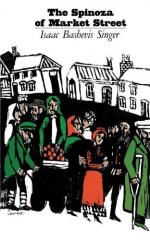|
This section contains 306 words (approx. 1 page at 400 words per page) |

|
The Spinoza of Market Street Summary & Study Guide Description
The Spinoza of Market Street Summary & Study Guide includes comprehensive information and analysis to help you understand the book. This study guide contains the following sections:
This detailed literature summary also contains Bibliography on The Spinoza of Market Street by Isaac Bashevis Singer.
Nobel laureate Isaac Bashevis Singer's short story "The Spinoza of Market Street" was first published in Esquire magazine in 1961, later anthologized in The Spinoza of Market Street, Singer's second collection of short stories. Irving Malin describes the title story as "clearly one of Singer's best," while Paul Kresh observed that this volume, which inspired Irving Howe to declare Singer "a genius," "marked another step in Isaac's acceptance as one of the great short-story writers of our time."
The story is set in the Jewish shtetl (a small community of Eastern European Jews) of Warsaw, Poland, against the backdrop of the events leading to the beginning of World War I in August, 1914. It concerns Dr. Fischelson, a scholar of philosophy who has devoted his life to the study of Benedict de Spinoza's masterwork, Ethics. Because of his skeptical ideas regarding religion, derived from Spinoza, Dr. Fischelson has been fired from his job at the synagogue library and alienated from the Jewish community due to their perception that he is a "heretic." When Dr. Fischelson falls ill, Black Dobbe, his "old maid" neighbor, nurses him back to health, and the two are soon married in the synagogue. On their wedding night, a "miracle" occurs, by which the old man and the homely woman engage in a surprisingly passionate consummation of their marriage. Dr. Fischelson awakens in the night to gaze up at the stars and murmur, "Divine Spinoza, forgive me. I have become a fool."
This story concerns many themes typical of Singer's short stories, particularly the conflict of the modern Jewish thinker in the context of traditional orthodox Chassidic Jewish religion and culture. The protagonist's ultimate experience of redemption through physical passion is ironically the event that brings him back into the fold of his Jewish community, having defied the dictates of Spinoza's rationalist philosophy.
Read more from the Study Guide
|
This section contains 306 words (approx. 1 page at 400 words per page) |

|



